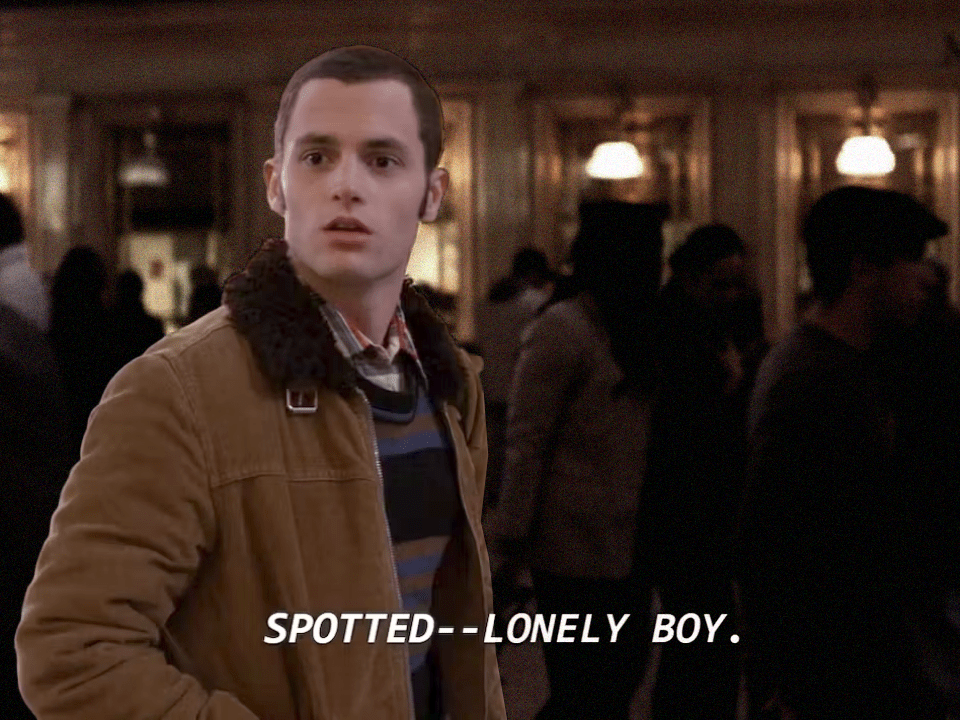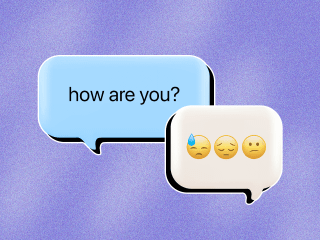5 Therapist Tips for Men Who Basically Have No Close Friends
No shame if you need to bookmark this.
Building deep friendships isn’t easy for anyone, but when you’re a cisgender, heterosexual man, getting emotionally close to a friend might seem especially tricky. If you can relate, welcome to the club. Many of us struggle to create compassionate, vulnerable friendships—especially with other dudes.
You should know this isn’t a personal failure though. In reality, the scarcity of close friendships among guys is likely a result of subscribing to a culture that's historically valued stoicism and individualism in men, says psychologist Henry Ortiz, PsyD.
Until very recently, pop culture portrayed the ideal cis straight man as a glorified loner who stifles emotions. He’s a provider who pulls himself up by his bootstraps and would never admit he cares for others or wants their attention. He’s a dude who prefers to get rowdy, watch sports, and brag about dominating others at work and in bed.
Even if you don’t buy into that brand of toxic masculinity and know that close, platonic relationships would benefit your life, you might worry that trying to connect with other men on a deeper level sets you up to be made fun of. Oftentimes, other men are afraid to admit they want this kind of support too, says psychotherapist and life coach Corey Yeager, PhD. Many of us have been trained through our interactions with peers (“you’re too sensitive”) to keep things surface-level with other guys. It can feel a lot safer than breaking social norms.
So we end up sticking to the status quo: We pretend everything is fine or focus on general life updates, sports, and great movies in social situations. And we don’t leave much room for conversations that start with, "My family is exhausting me," or "My boss is toxic.”
But having supportive buds improves our lives and makes us feel good. “We're social animals,” Dr. Ortiz says. “Relationships give us a sense of belonging.” If you’re open and honest about what’s going on in your life, a close friend can serve as the first line of defense when you’re struggling, Dr. Yeager says. They allow you to release some of the anxiety or other uncomfy emotions caused by your everyday struggles, he adds.
If you’re up for fostering deep friendships, here are five therapist-backed tips for building a stronger inner circle and challenging the cultural norm around male friendships.
1. Sift through your existing friendships.
Even though you may feel alone, odds are you’ve got at least a few friends who’d be willing to go deeper with you. To find them, you’ll need to do a quick audit to get a sense of who you’ve outgrown (your high school mutual friend), who might be better as a surface-level connection (your new work buddy), and who has close friend potential.
Fact is, you can’t have a deep friendship with everyone in your life—and acquaintances are still important. But if you have at least one guy in your life you can trust and share intimate details with, that’s your sign he could become a closer friend, Dr. Yeager adds.
To kick off your audit, think about each person and whether your values and interests align. Do their problematic social media posts make you cringe? Do they make you feel insecure? Do you feel like you don’t have much in common? Those are signs this friendship isn’t a great place for growth, explains Dr. Ortiz.
The people you could get closer to are the ones who inspire you to be better. They might be the guys who already know intimate details about your past, who have overcome similar struggles, or who share similar dreams.
Overall, the goal is to find a healthy mix of acquaintances, surface-level pals, and close friends to bring balance to your life and help you feel more connected and less lonely.
2. Create opportunities to broaden your circle.
If you need to go out and make new friends from scratch, put yourself in settings that will prompt interactions with people who hold whatever traits you respect and value. It can be at the library if you want a crew that’s well-read, a social club if you want them to be outgoing, an Alcoholics Anonymous meeting if you want them to live a sober lifestyle, or a volunteer program if you want them to be empathetic. You could also hit up the gym, a professional meetup, a concert, or a game.
At the end of the day, many of us are more isolated than we care to admit, so let that give you confidence to spread your wings. It may be uncomfortable to strike up conversations with people you don’t know, but it all starts with asking someone how they’re doing, Dr. Yeager says.
If the chit-chat is flowing with another dude, throw out an invite to chill down the line, saying, “Man, I’d love to hear more about your work.” You could even ask, “Down to catch the next game together? or “Wanna keep talking over some pizza?” It’s not wildly different from dating, but admitting you want to hang out again takes courage, especially in a society that tells men they aren’t supposed to seek platonic companionship, Dr. Yeager says. So give yourself some grace if you’re nervous, feel ashamed, or even strike out a few times.
3. Cultivate the friendship you want.
When you aren’t used to being so open and don’t know how someone will react, try to embrace vulnerability and let the good dudes know you appreciate them and want to spend more time with them, Dr. Ortiz says. By doing that, you’re basically exemplifying the kind of friend you’d like them to be in return. From there, see who responds in a positive way and who doesn’t. That’ll enable you to foster the friendships with the most potential.
Try texting someone, asking, “What’s up? Anything decent going on this weekend?” which tells them that you’re thinking about them even if they didn’t expect you to. The friends who get back to you in caring ways are the ones you can grow closer to.
That said, there’s a fine line between pushing too hard and not pushing enough, Dr. Yeager says. Obviously, you don’t want to keep texting someone who didn’t reply to your first message. We’re not trying to love bomb our new friend or make them think we have nothing better to do. If you don’t get a response, wait a few days before checking in again, perhaps with a suggestion of what you guys could do when you hang so they know what they’re signing up for. You’re giving them space without letting the friendship vibes fizzle out.
4. Test the waters by talking about your feelings.
Don’t worry, you can ease into being vulnerable, Dr. Ortiz says. If you meet a bud to watch pro wrestling, don’t unload every trauma you’ve ever been through on them mid-match. Instead, share a little something that’s been bothering you during commercials or during the worst match. If that feels strange, you can even address the elephant in the room and preface the convo by saying something like, “I hope you don’t think it’s weird to open up about things like this, but I could use someone to talk to. I’m stressing about _____, and I value your opinion.”
Then, wait for their reaction and remember that not every dude will handle this well. Still that doesn’t mean you should abandon all hope of having meaningful friendships. “The ones who respond poorly are probably not the folks that you want to have as close friends anyway,” Dr. Ortiz says.
If they respond to you putting yourself out there in a meh way, you could say you think guys should be able to talk about their feelings with their friends—or how it sucks that more dudes don’t think that they can. You could even turn it into a joke, asking them if every guy is supposed to just watch sports and scratch their balls all day.
If your friend doesn’t have the capacity to question the ways society has boxed them in or hold space for you, change the subject. If they get defensive or rude, say, “I think I better go,” and make your exit. When you replay these convos later on in your mind, remember that you’re not out of pocket for wanting more support.
Now, if someone responds in a way that makes you feel seen by asking questions about your situation and listening with compassion, that’s a great sign this friendship has the qualities you’re looking for, Dr. Ortiz says.
5. Stay positive and accept that rejection is part of the game.
If your buddy doesn’t return your call, you may assume you messed up by opening up to them or you were too sensitive—but try not to make negative assumptions like that, Dr. Yeager encourages. Though you might feel weird about vulnerability now, it’s a positive step toward building a solid connection over the long term. Also, there are plenty of reasons why they didn’t respond in a way that reassured you that you’re good. Maybe their life is an actual shitshow.
The other truth is: Not everyone is meant to be your friend, and not every friendship is meant to last forever, Dr. Yeager says. If a connection doesn’t happen, it’s not a reflection of you or your personality. “It's really about, does [this friendship] fit for both parties? And is the timing right for both parties? If the answer to any part of that is no, then it just may not work,” he says.
To ease any sense of rejection, keep in mind that “even if it doesn't work out, [you] get to apply what you learned to the next friendship,” Dr. Yeager adds. Trust, there are plenty of other folks who would love to be your friend.
Wondermind does not provide medical advice, diagnosis, or treatment. Any information published on this website or by this brand is not intended as a replacement for medical advice. Always consult a qualified health or mental health professional with any questions or concerns about your mental health.




